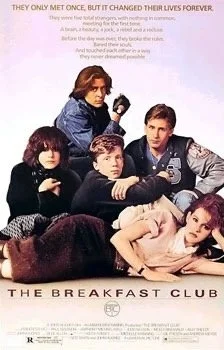Director: John Hughes
Cast: Emilio Estevez, Paul Gleason, Anthony Michael Hall, Judd Nelson
Have I Seen it Before: Oh, sure. I think anyone who’s had cable at any point in their lives has probably pieced together the film a few minutes at a time.
Did I Like It: I think my reaction in the past to this movie is pretty easy to sum up. It’s a minimalist wonder, and I don’t like Molly Ringwald all that much. I never really liked Molly Ringwald, and I could never quite get through Pretty in Pink (1986) because of it.
But that feels like a reaction that’s not entirely equal to the current moment. In the past, the film’s refusal to answer the question of whether or not the characters would feel the same about each other on Monday as they did during their stint in detention was an optimistic choice, as we were allowed to believe that this Saturday had truly changed their adolescent lives. Not only were things back the way they were within the next week, by the end of April, 1984, I imagine they barely remembered anything that happened in March. I guess that is the cynicism that comes with time. It may not be the film’s fault.
Yes, this film proves to be largely less pointedly problematic as, say, Sixteen Candles (1984) seems to delight in being, but with a leering, abusive protagonist like John Bender (Nelson) at its core (and he is the hero of the piece, don’t kid yourself), the movie does seem to ever so slightly wilt as the years continue. That toxicity Bender delights in (and I’d venture to say might be Hughes’ true proxy in the piece) is pontificated on (among a larger reckoning with Hughesenalia) by Molly Ringwald in a recent piece for The New Yorker. I’d recommend you five the piece a read. It certainly moved me from being a dyed-in-the-wool supporter of the film to someone who wants to keep its true nature in perspective.
Maybe I need to finally get over my bullshit and watch Pretty in Pink all the way through.

